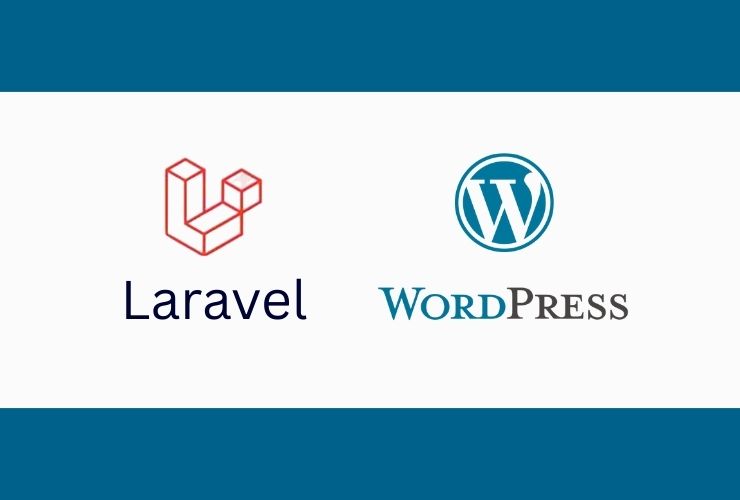Perhaps most important when you begin a web development project is deciding which tool to use to get the work done. Both Laravel and WordPress are two very popular choices, but each are used for very different purposes and cater to differing needs. From creating a plain blog, e-commerce website, or advanced web application, getting to know Laravel and WordPress differ is important so that you use the right tool for your work.
In this blog, we’ll compare Laravel and WordPress across several important factors, including ease of use, flexibility, scalability, and customization.
What is Laravel?
Laravel is a PHP framework designed for building custom web applications. It’s not a content management system (CMS) like WordPress but a full-fledged development framework that gives developers the tools to build complex, data-driven websites and applications.
With an elegant syntax, strong routing, Blade templating engine, and intrinsic support for operations such as authentication and caching, Laravel is perfect for developing apps that need flexibility and tailored logic. It provides developers with complete control over application structure and logic.
What is WordPress?
Conversely, WordPress is an easy-to-use CMS that enables you to create websites with minimal coding skills. It runs more than 40% of all websites on the web and is among the most widely used CMS platforms in use today. WordPress has many themes and plugins included, which can easily make your site up and running with a speedy setup.
Although it is typically utilized for blogs, portfolios, and small to medium-sized websites, WordPress can be stretched to develop more advanced solutions with custom plugins and themes.
Key Differences Between Laravel and WordPress
1. Ease of Use
WordPress: WordPress is easy to use. With its user-friendly admin panel, drag-and-drop page builders, and pre-designed themes, anyone can easily create a website. It’s an ideal choice for users with little or no coding skills.
Laravel: Laravel, however, needs good knowledge of PHP and web development principles. It’s for developers who are comfortable with writing their own code and managing the full-stack development process.
2. Flexibility and Customization
Laravel: Laravel offers full flexibility and customization. As it’s a framework, you can design your application in any way you want, and it’s best suited to create custom web applications with distinct functionality.
WordPress: Although WordPress is extremely flexible with themes and plugins, it’s still limited by the platform’s own capabilities. For very particular features or customizations, WordPress will need further development or third-party plugins, which can impede performance.
3. Scalability
Laravel: Laravel is an excellent framework for creating scalable applications. Proper architecture and coding strategies make it easy for Laravel to manage heavy, complex sites and applications with high traffic.
WordPress: WordPress can scale to a certain degree (particularly when properly hosted and optimized), but it’s usually best for smaller sites. With more traffic and complexity on the site, WordPress may start to slow down unless it’s well optimized.
4. Security
Laravel: Laravel provides robust security features by default, including CSRF protection, encryption, and robust authentication. Yet, it demands regular updates and secure coding standards from developers in order to be secure.
WordPress: Because WordPress is highly used, WordPress is a primary target for those who hack websites. Although WordPress has robust security features, such as automatic update and user role management, it is up to you to protect your WordPress website with the theme, plugins, and third-party tools you pick. You must have regular updates and security plug-ins to ensure your site stays secure.
5. Development Speed
WordPress: WordPress permits faster development when you want to develop a plain site. Using thousands of existing templates and plug-ins, it’s easy to rapidly build up a site without so much individual custom development.
Laravel: Laravel requires more development time due to its custom nature. Developers need to write code for almost every feature and function, which can extend the timeline for building complex applications. However, this also means the end product will be highly tailored to your needs.
6. Community and Support
Laravel: Laravel boasts a large community of developers, and there is voluminous documentation and tutorials for learning and debugging purposes. It is supported by a passionate community of developers and a huge collection of open-source packages.
WordPress: WordPress boasts a huge international community and lots of tutorials, forums, and support mechanisms. You can get answers to your questions easily, outsource developers, or locate plugins and themes that suit your requirements.
Which is Best Suited to Your Project?
Either Laravel or WordPress depends on what your project demands.
Go for WordPress if:
You want an easy, no-frills website, blog, or online shop. It is ideal for small enterprises, individual sites, and content-heavy projects where the fast-launch advantage outweighs features.
Use Laravel if: You require a highly customizable web application with intricate business logic, custom functionality, or special performance needs. Laravel is an excellent option for creating custom applications, enterprise solutions, or if you are developing a large-scale, data-driven project.
Conclusion
Both WordPress and Laravel have their own strengths, and the optimal solution for your web project depends on your intentions, timeline, and technical specifications. WordPress is a great solution for less complicated projects that must be deployed quickly, whereas Laravel is best suited for intricate applications that need customized development and scaling. Whatever you decide, make sure it matches your long-term business objectives and the user experience you want to deliver.













 Database Development
Database Development












































